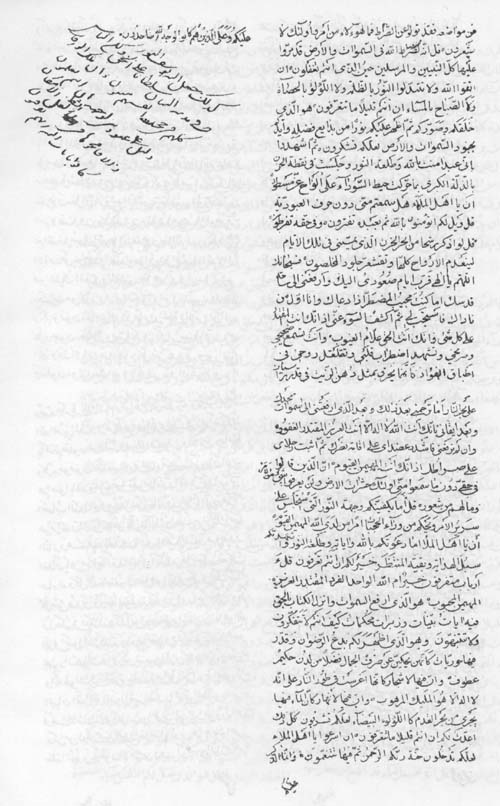Baha'i Assassinations
7. Allegation of “Shedding Baha's Most Pure Blood
Sir Abbas Effendi does not state when and where was the most pure blood shed with impunity!
In the flower of his age, Sir Abbas Effendi wrote the Traveller's Narrative. In the Narrative he cited himself for himself as authority to support his father's pretensions. In the Narrative, he blacked out all Bahai assassinations. In the Narrative, he did not breathe a word about the allegations.
In his senility Sir Abbas Effendi wrote his Will and Testament, with his foot in the grave, he fabricated the allegation [that Baha's blood was shed] broke the record. It appears that Bahaism batters on falsehood.
7.1 The Cause of Baha's shaky Hand
"For long years", to quote from the Tanbih-al-Naimin (Awakening of the Sleepers, P.65," the disease ) of hernia was inseparable from the person of Baha, and those present and absent were an eyewitness to his hand's shaking continuously from palsy."
The text sums as follows:
« سالهای دراز جناب ابوی را مرض فتق ملازم رکاب و رعشة دست شاهد حضور و غیاب »
Traces of Baha's palsic hand are observed on his own writings penned in his own handwriting:
a) in the Iqlim-i-Nur by Mirza Muhammad Ali Malik Khosravi, a Bahai writer, P.253, facsimile is reproduced of a document dated 1262 A.H (1845-6), to which Baha subscribed as a witness. Baha inscribed upon the document a statement penned in his own handwriting and sealed with his own seal 'Hussayn Ali'.
The document containing Baha's inscription was reproduced as a specimen of Baha's handwriting and sealed at the time.
Traces of Baha's palsic hand are observed in the statement inscribed upon the document.
b) traces of Baha's palser hand are also discerned in the colophons penned in his own handwriting in his Will and Testament in the Baghdad period.

The inscription on the document and the colophons of the Will and Testament belie Sir Abbas Effendi's allegation, avowedly intended to cover up physical defects.
7.2 Allegation of Poisoning Baha
Mirza Muhammad Jawad of Qazwin, author of the Historical Epitome incorporated in the Materials for the Study of the BÁBi Religion by Prof. Browne, underwent a term of imprisonment at Tabriz, Iran. He does not state why he was arrested and having secured his release from imprisonment he betook himself to Edirne … Materials, ibid, P.25. He accompanied Baha to Acre.
On his own admission Mirza Muhammad Jawad of Qazwin was an accessory before the fact in the murder of Sayyid Muhammad of Isfahan, Mirza Rida Quli of Tafrish, and Aqa Jan Beg Kaj Kulah. Materials, ibid P.54.
Contradicting Sir Abbas Effendi that Baha allegedly took the poison in order not to disappoint Subh-i-Azal, Mirza Jawad alleges that the attempt to poison Baha was by means of a cup of tea with milk containing poison which Baha drank some of it, which version is in turn contradicted by Baha's daughter Bahiyya Khanum who alleges that the attempt was made by means of a dish, one half of which was mixed with poison. Baha himself alleged victim, advances no such allegation.
Those conflicting and contradictory versions of one and the same allegation are in themselves sufficient to dismiss the allegation as false and devoid of foundation.
Mirza Jawad and Baha's daughter [Bahiyya Khanum] have identical views as regards to the allegation to have Baha assassinated in the Bath. Baha refers to would be assassin as "one of my attendants" without naming him.
As admitted by Shoghi Effendi also, god passes by, p.114, Subh-i Azal and members of his family lived in a dilapidated quarter of the city. Their meals were provider from Baha's kitchen. The Awakening of Sleepers (Tanbihun-Naimin), PP. 18-19.
The Hasht-Bihisht (“the Eight Paradises”), PP. 304-305:
“The first juggle and trick of sorcery which he [i.e. Baha] outlined was this, that he brought to Hazrat-i Azal [i.e. Subh-i Azal] a dish of plain food, with one side of which he had mixed with some poison, intending to poison His Holiness. For hitherto the apportioned breakfast and supper of His Holiness the Fruit [Hazrat-i Thamara, one of the titles conferred on Subh-i Azal by the Point] had been from the house of Mirza Husayn Ali [i.e. Baha].
When that poisoned dish was placed before His Holiness, Mirza Husayn Ali pressed him to partake of it. By a fortunate chance the smell of onions was perceptible in the food, and His Holiness, being averse to taste it. Mirza Husayn Ali continued to press him urgently to eat. He replied, “it smells of onions, I will not eat it; if it is so good, eat it yourself. From this answer Mirza Husayn Ali supposed that His Holiness had divined his evil design, and, simply put the view of disguising the truth and putting a better appearance on the matter, ate a little from the other side [i.e. the unpoisoned side] of the dish, in order that the suspicion of His Holiness might perhaps be dispelled and he might eat the poisoned side. But His Holiness, because of the smell of onion would not eat.”
To read more about Bahaism go to the main page, select 'Bahaism' and navigate through the options.